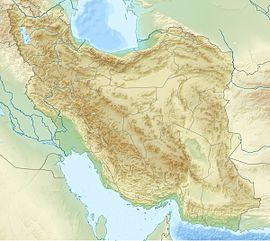Kuh-e Bidkhan
| Hazaran | |
|---|---|
| Kuh-e Hazar | |
| Highest point | |
| Elevation | 4,500 m (14,800 ft) |
| Prominence | 2,741 m (8,993 ft) |
| Listing | Ultra |
| Coordinates | 29°30′42″N 57°16′18″E / 29.51167°N 57.27167°ECoordinates: 29°30′42″N 57°16′18″E / 29.51167°N 57.27167°E |
| Geography | |
| Location |
Central Iranian Plateau, Kerman Province, Iran |
| Parent range | A central Iranian range (Sahand-Bazman volcanic belt or range) east and parallel to the Zagros Mountains |
Hazaran (Hazar, Hezar) is the name of a massif of the Central Iranian Plateau, Kerman Province, Iran, an eastern outlier of the Zagros Mountains. With an elevation of 4500 metres, it is the highest peak in Kerman Province. The jebal Barez chain is a continuation to the south-east. The Halil River rises in the Bid Khan region. The massif is situated in the area encircled by the cities of Kerman, Bardsir, Sirjan, Baft, Jiroft and Bam.
Made chiefly of Eocene andesite and pyroclastic rocks, Mount Hazar or Hazaran is situated in a central Iranian range, Sahand-Bazman volcanic range or belt, a mountain range which was formed mainly during Eocene volcanism and that stretches approximately from Sahand Volcano in the north-west of Iran to Bazman Volcano in the south-east of Iran.
Major peaks:
...
Wikipedia

